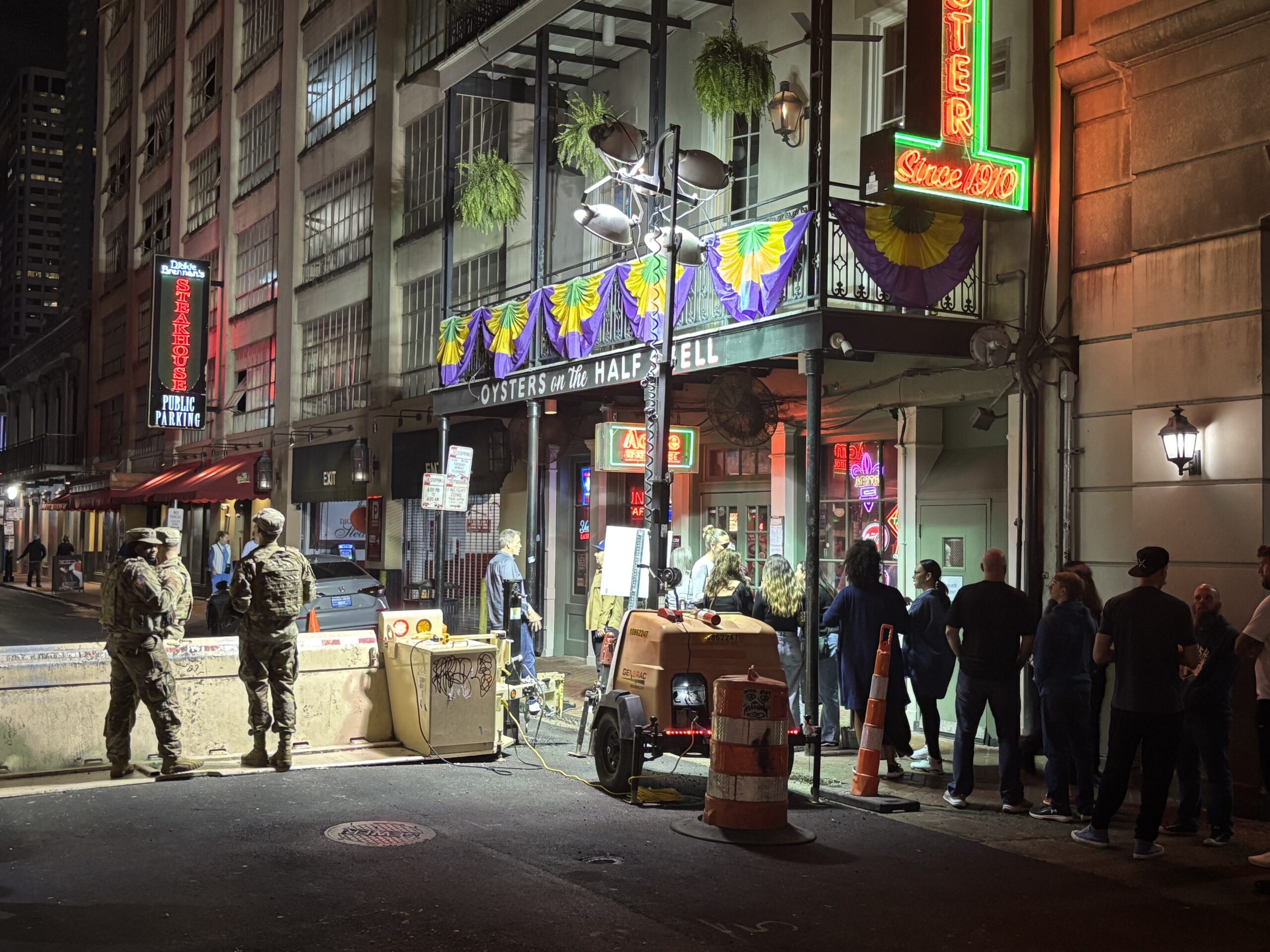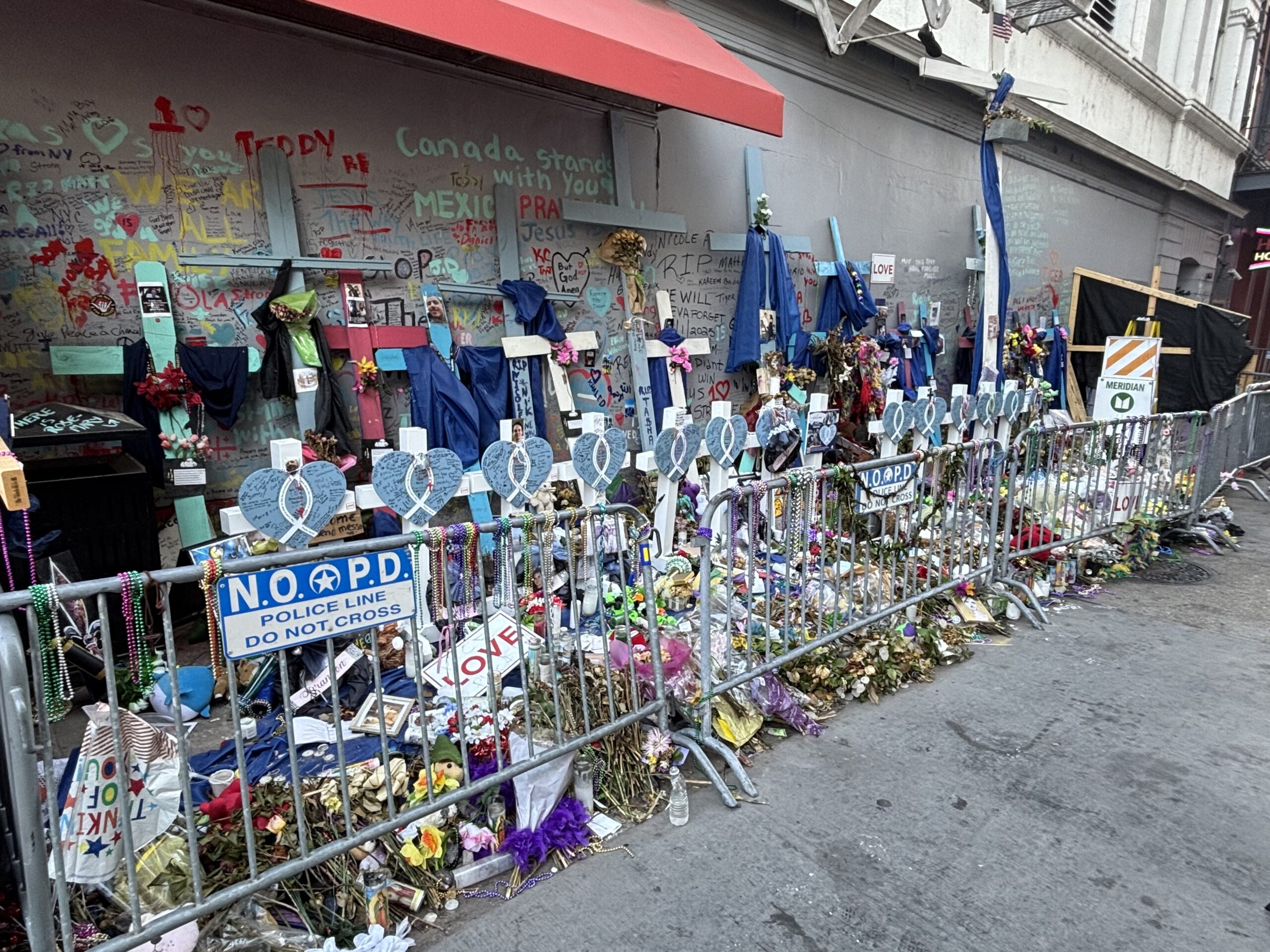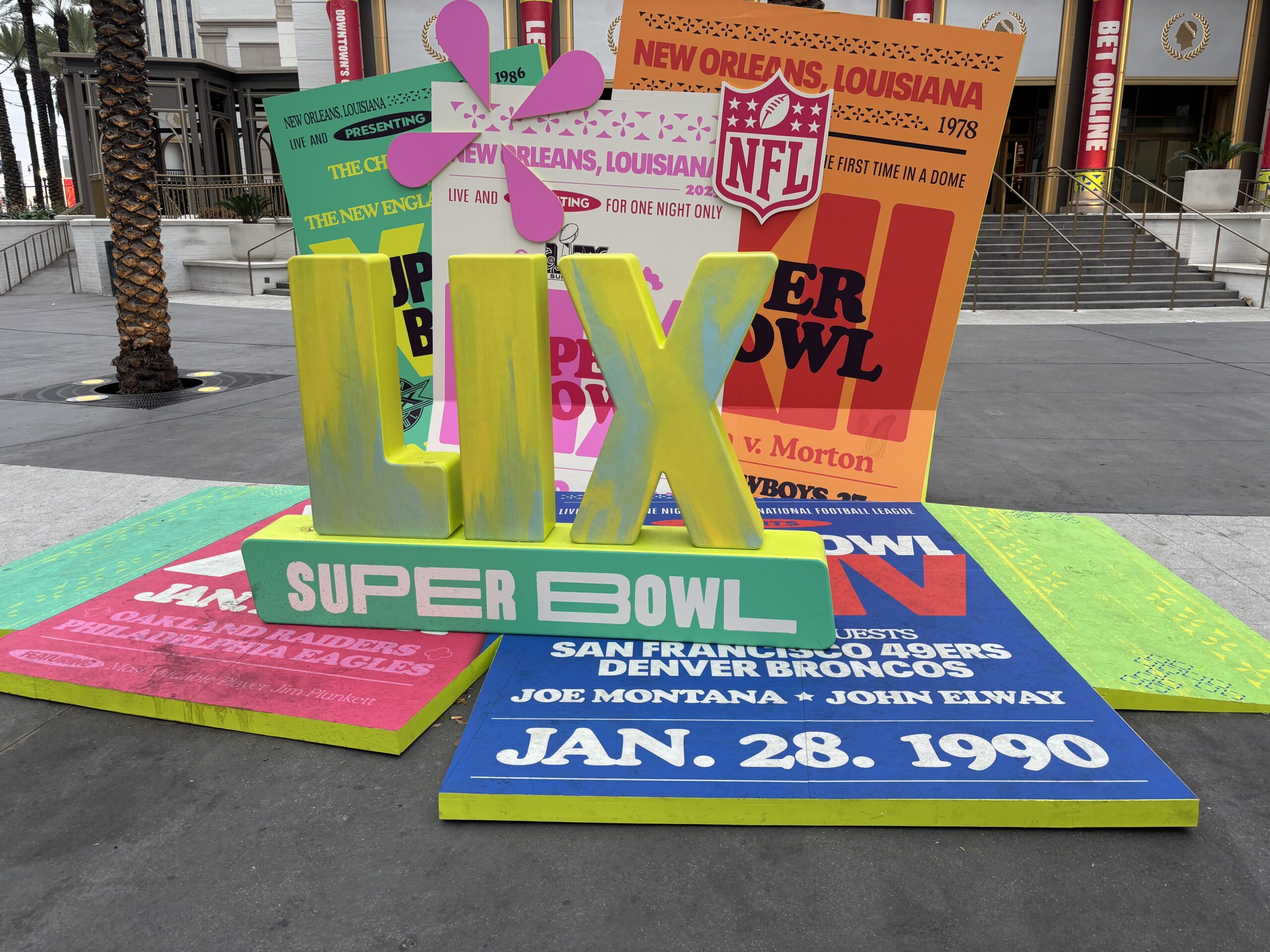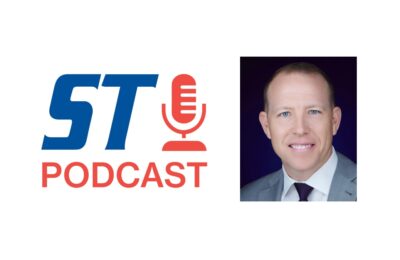
NEW ORLEANS — It is 10 p.m. Wednesday night on Bourbon Street, a place where excess is not just tolerated but encouraged, and the nightly party in the streets is starting to begin. People of all ages (over 21 of course) and backgrounds walk up and down the legendary street, drinking and carousing while DJs blast dance music out the front doors of clubs and a man tries to entice people into a karaoke bar wearing a Hawaiian miniskirt and coconut bra, just a few spots down from the greeters in green tuxedos at Pat O’Brien’s.
Also on Bourbon Street, standing on every corner as revelers walk around with drinks and beads, is a mix of New Orleans Police Department uniforms and National Guard people wearing camouflage and holding high-powered rifles. At least half a dozen, sometimes a dozen or more, stand guard as massive strobe lights illuminate each block. The French Quarter is both a central gathering spot for partiers and an area under lockdown.
In a few days, the Super Bowl returns to New Orleans for the first time in more than a decade. Organizers have spent years planning for a party to have the world’s spotlight on the Superdome, a civic treasure of resilience and sporting history celebrating its 50th anniversary. For those outside of the city — and those in town this week — there is also an unmistakable security presence. Not only because of the Super Bowl, but because of a terror attack that killed 14 people on New Year’s Day.
But make no mistake: This weekend will be a celebration of football and of New Orleans. The host committee has spent considerable time and effort planning a Mardi Gras-style football parade that will go through the French Quarter on Saturday night. Sunday evening, New Orleans will tie Miami as the city that has hosted the most Super Bowls (11) and the Superdome will extend its spot atop the list of venues that has hosted the most Super Bowls (8).
“We’re going to work hard to be safe, but we’re going to enjoy the experience of the greatest game in American sports,” said Marcus Brown, Super Bowl Host Committee chairman. “There is no city that knows how to party better than us. Mardi Gras is the most complicated multi-week party on the planet. And we do that party every year relatively safely with millions of people who come down here and enjoy it. We want people to have the same type of experience for the Super Bowl and we think they will.”

Increased Emphasis on Security
That experience is contingent on people being safe. The New Year’s Day attack came hours before Notre Dame and Georgia were to meet in a College Football Playoff quarterfinal, thrusting the Sugar Bowl and city into a blender of emotion and uncertainty as the FBI, state and local law enforcement converged on the area, the game being postponed until the following afternoon.
Greater New Orleans Sports Foundation President and CEO Jay Cicero said NFL security flew to New Orleans within hours of the attack and worked with all stakeholders to go through a review of the security plans and upgrade as needed.
“(It) really galvanized them to say, let’s take a look at everything that we’re doing,” Cicero said. “Let’s enhance it to make sure that we’re taking care and making everyone feel safe.”
Along with additional security stationed at each corner of the French Quarter are barriers; at the corner of Canal and Bourbon Streets, where the attack started — next to a memorial for the 14 who died — are multiple trucks and blockades with all bags being searched. Walking down any block of the French Quarter, along with barriers, are dozens of police and federal military vehicles and trucks.
“This will be the safest Super Bowl ever,” said Louisiana Lieutenant Governor Billy Nungesser, who is also the commissioner of the Louisiana Department of Culture, Recreation & Tourism. “Those barriers will stay in place for Mardi Gras. We continue to pray for those families. Because of that event, New Orleans and Louisiana will be a safer place to visit. We will make sure of it.”
NFL Chief Security Officer Cathy Lanier said at a Wednesday press conference that there will be heightened security around the game — and that was even before the news that the President will be in town.
“People here recognize that terrorism can happen anywhere,” Brown said. “But what we all don’t want is for that to change the way we live. With respect to the families and the victims, I thought it was important that the Sugar Bowl was actually played. Because it demonstrated that we’re not going to let terrorism win. And the Super Bowl coming on the heels of that, it’s another opportunity for us to show the determination, the resiliency of not just this community, but, frankly, the American spirit.”
Having Fun in New Orleans
The spirit of New Orleans is football, which is why the NFL has been to town so much over the years.
“In New Orleans, you have a celebration every single day,” said Frank Supovitz, the founder of Fast Traffic Events & Entertainment who organized hundreds of events in more than two decades as a senior executive for the NFL and NHL, including the last Super Bowl in New Orleans. “When you’re bringing an event like the Super Bowl, or any other event, you’re not creating the excitement in this marketplace. The excitement’s already here. You’re adding to the excitement.”
The spirit of New Orleans is also Mardi Gras, which is why New Orleans is hosting the Super Bowl this year. It was scheduled to host last year’s game but when the NFL expanded the regular season by a week, it pushed the 2024 Super Bowl date into a conflict with Mardi Gras.
Cicero said when the host city contract was originally signed, there was a provision that should such a conflict occur, New Orleans would get the following year’s Super Bowl instead (which is why Las Vegas hosted last year).
“Our look and feel and everything that we’re doing is about the history of the Super Bowl of New Orleans as well as a unique culture of New Orleans,” Cicero said.
There’s still learnings, Cicero added, since the last time the city hosted. A group from New Orleans attend every Super Bowl to pick up new learnings on what is transferrable for its city and what can be done differently than the last time in 2013.
“We’re not egotistical enough to say that we don’t need to learn from other cities,” he said. “ We learn everything from other cities. And that’s part of what our mantra is that we love doing these events.”
Super Bowl week tourism will help set a record for visitation in the state this year, Nungesser said, predicting more than 54 million will come to Louisiana between the Super Bowl, Mardi Gras and more. The Super Bowl will also bring significant international attention to New Orleans, which the host committee is banking on will attract a new demographic of visitors.
“Think about what people just experienced with the Olympics in Paris,” Brown said. “If you’ve been there before, you wanted to go back. If you’ve never been there before, you really wanted to go. That’s New Orleans. … through a tourism perspective, we think it’s going to be a real driver.”
And as Nungesser added, “it’s probably the only Super Bowl you’ll attend that has its own Mardi Gras parade.”

Cementing a Super Future
The parade, scheduled for Saturday, will have 20 floats, bands and other groups throughout the French Quarter and “that’s an example of something that you can’t get that anywhere, I don’t care where you go,” Brown said. “Those are the kinds of things that we add into the well-known, well-loved history of what we do here to make sure that we have a great shot in the future.”
That future for Super Bowl hosts is not determined past 2028. New Orleans held its first Super Bowl in 1970 and for decades never went more than seven years without hosting one. But this year will only be the second time since 2002 the Super Bowl comes to town.
To use the tagline “Built to Host,” you need a spectacular venue in which to welcome the world. And New Orleans certainly has that in the Caesars Superdome, which opened 50 years ago but has the feel inside of a new facility after more than a half-billion dollars of improvements.
The old Superdome had narrow concourses, which caused massive traffic jams for people going to the restroom and waiting for concessions. Now, the concession and walking area has been widened by about 50 feet. The ASM Global-managed facility recaptured 100,000 square feet of fan-facing space and 50,000 more in back of house.
“It’s not only great for the Super Bowl, but it’s great for the New Orleans Saints,” Cicero said. “It’s great for Men’s Final Four. It’s great for wrestling. It’s great for every event.”
Along with 11 Super Bowls, the city has hosted six men’s Final Fours and five BCS or CFP national championship games. It’s where a freshman named Mike Jordan became Michael Jordan; where Sugar Ray Leonard made Roberto Duran say “No más” and Muhammad Ali won a third heavyweight title, where Tom Brady started the New England Patriots’ dynasty.
But a place that has been where athletes become legends does not ensure that the Super Bowl always comes to town. New NFL stadiums such as SoFi Stadium in Los Angeles and Allegiant Stadium in Las Vegas have already hosted Super Bowls (and LA will host again in 2028). There are other traditional hosts including Miami and Atlanta. Santa Clara, California, hosts next year’s Super Bowl, Dallas’ AT&T Stadium stands ready to host again and there are scheduled new stadiums in places such as Nashville.
“We hope we don’t have to wait a decade for the 12th,” Cicero said. “We’ve told the league that 12 years is too long. I think they agree. That doesn’t mean we’ll be awarded one before then, because of all the factors you’re talking about with new stadiums, other host cities that have the desire to host. (And) there’s a lot of Mardi Gras conflicts for us. To be able to host it, we have to have everything kind of line up. We really have to take into account what the calendar is and target that with the league and work with them.”
What Cicero and those in New Orleans promote is its ability to walk nearly everywhere; from Bourbon Street to the NFL Fan Experience is about a 25-minute trek. Before every Saints game, Champions Square — a massive pregame/tailgating area next to the stadium — is filled with fans, music, sponsor activations and plenty of “Who Dat?” chants.
“Many of the other venues where you can have a Super Bowl, you’ve got to get in the car, get in an Uber and you’ve got to go 35, 40 minutes out to the facility,” Brown said. “You can walk from the convention center to the French Quarter to the Superdome, all from your hotel room.”
Nobody will come to New Orleans to hang out in a hotel room. This is a city to be social in, a city to soak in the culture, to eat the food, savor the experiences. It’s why there have been so many mega sporting events to this destination, time and again. It’s why, as the Host Committee has printed on banners all around the Convention Center, it’s “Built to Host” when it comes to Super Bowls.
“It’s not pressure, although there is an obligation to meet the standard — and if you’ve had 11 Super Bowls, there is a standard,” Brown said. “We believe when you add the culture and all the great experiences that New Orleans has to offer and a walkable city, we want to remind people that that is why this is a uniquely special place to have any event, but particularly a big event.”






























 Copyright © 2025 by Northstar Travel Media LLC. All Rights Reserved. 301 Route 17 N, Suite 1150, Rutherford, NJ 07070 USA | Telephone: (201) 902-2000
Copyright © 2025 by Northstar Travel Media LLC. All Rights Reserved. 301 Route 17 N, Suite 1150, Rutherford, NJ 07070 USA | Telephone: (201) 902-2000